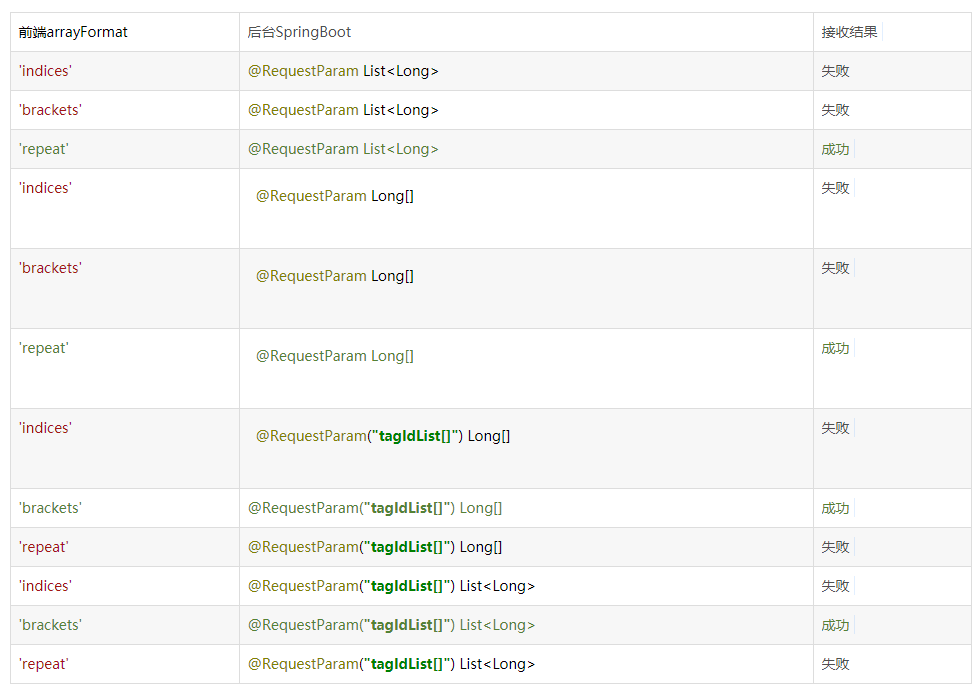最近和前端联调是出现参数结构问题,下面就遇到的问题进行记录——由于本人非后台开发人员,所以一些前端代码只做记录不做详细解释
前端技术参考地址已经附加在下文,请尊重原创
后台参数接收格式
@RequestBody List<Long> idList
或者
@RequestBody Long[] idList
前台传递格式
let idLists = [];
that.checkBoxData.forEach(function(e) {
idLists.push(e.consumeId);
});
API.stop(idLists)
.then(
function(result) {
that.loading = false;
if (result && parseInt(result.code) === 0) {
that.$message.success({
showClose: true,
message: "停用成功",
duration: 1500
});
that.search();
}
},
function(err) {
that.loading = false;
that.$message.error({
showClose: true,
message: err.toString(),
duration: 2000
});
}
)
如果后台传参为
@RequestParam("supplierMaterialids[]") Long[] supplierMaterialids
则前端传参格式——红色部分
stopStatus:function (){ this.hospitalsupplieridarr=[]; let that = this; if(this.checkBoxData.length<1) { this.$message.error({ showClose: true, message: "请选择一条数据进行停用", duration: 2000 }); }else{ for(var i=0;i<this.checkBoxData.length;i++) { this.hospitalsupplieridarr.push(this.checkBoxData[i].supplierrelationshipid) } let params = qs.stringify( {hospitalSupplierids:this.hospitalsupplieridarr},{ arrayFormat: 'brackets' }); this.$confirm("确认停用供应商吗?", "提示", {type: "warning"}) .then(() => { API.setHospitalSupplierStopStatus(params).then(res => { if (res.code === 0) { that.$message.success({ showClose: true, message: "停用成功", duration: 2000 }); that.search(1); } else { that.$message.error({ showClose: true, message: "停用失败", duration: 2000 }); } }); }).catch(() => { }); } },
下面是网上查的资料关于——vue qs.stringify 和JSON.stringify 区别
参考链接——https://www.cnblogs.com/web1/p/8659398.html
qs可通过npm install qs命令进行安装,是一个npm仓库所管理的包。
而qs.stringify()将对象 序列化成URL的形式,以&进行拼接。
JSON是正常类型的JSON,请对比一下输出
var a = {name:'hehe',age:10};
qs.stringify(a)
// 'name=hehe&age=10'
JSON.stringify(a)
// '{"name":"hehe","age":10}'
其中qs 分为三种类型——参考链接https://blog.csdn.net/pifutan/article/details/86320705
qs.stringify({ids: [1, 2, 3]}, {arrayFormat: ‘indices‘})
//形式: ids[0]=1&aids1]=2&ids[2]=3
qs.stringify({ids: [1, 2, 3]}, {arrayFormat: ‘brackets‘})
//形式:ids[]=1&ids[]=2&ids[]=3
qs.stringify({ids: [1, 2, 3]}, {arrayFormat: ‘repeat‘})
//形式: ids=1&ids=2&id=3
对比:

总结:使用List<Long>和Long[]是没有区别的,区别在于@RequestParam中是否加[]
qs.stringify({ids: [1, 2, 3]}, {arrayFormat: ‘indices‘})
//形式: ids[0]=1&aids[1]=2&ids[2]=3 @RequestParam无法接收
qs.stringify({ids: [1, 2, 3]}, {arrayFormat: ‘brackets‘})
//形式:ids[]=1&ids[]=2&ids[]=3 要加[]
qs.stringify({ids: [1, 2, 3]}, {arrayFormat: ‘repeat‘})
//形式: ids=1&ids=2&ids=3 不能加[]